Talks about her love of family, her fitness regime and her plans to help fund an orphanage.
For those of you who have been following us on the journey that is Hollywood Authentic, you may notice some changes to this, the third issue. Principally, how we have gone big on the cover story – 16 pages big, to be exact. Hollywood Authentic is constantly evolving, and now you will start to find much more online at hollywoodauthentic.com, where I share videos, audio and update you more regularly on what we’re up to.
The printed magazine is therefore becoming more and more of what I always wanted it to be: an opportunity to create the kind of features on actors that inspired me when I first got into photography and were found in the pages of magazines like Life back in the day. The task, then, was to spend time with the artists and give readers a rare insight into the kind of people they really were, the type of insight that only comes if you break away from predictable, organised press access and instead get to do real stuff with these real people.
The response we have had to the first two editions of the magazine has been great. It seems that readers and industry insiders alike recognise that we are trying to create something different here. One studio executive went so far as to tell me, ‘Hollywood needs this’, by which I took him to mean that fans of film need to be reminded that the movie industry is made up of talented, complex, interesting, creative artists rather than “celebrities”.
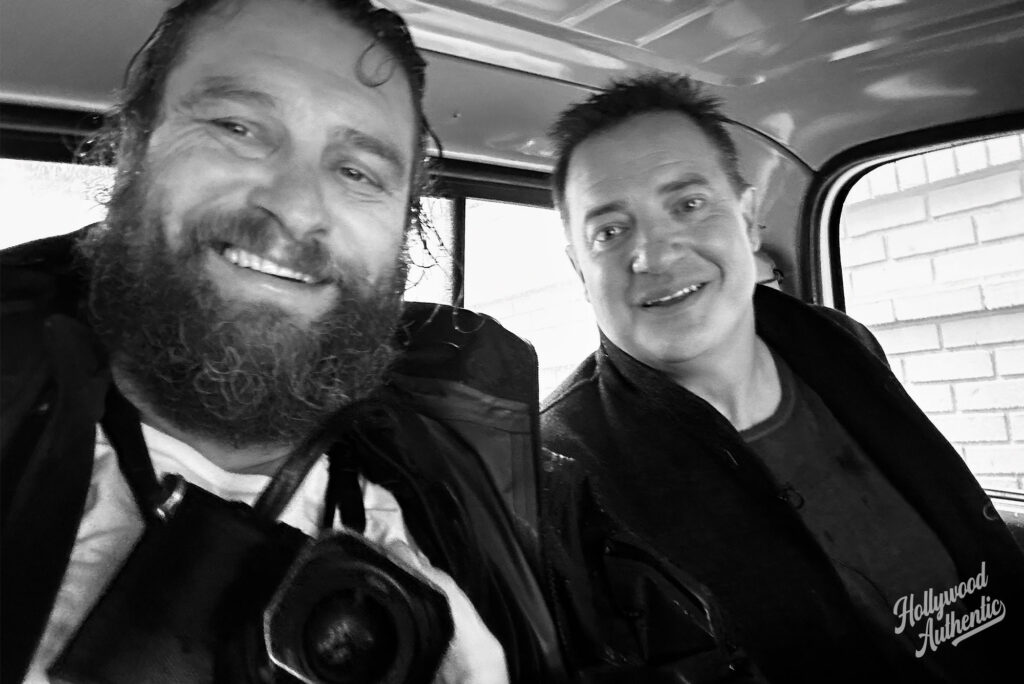
One man who knows all about talent and complexity is this issue’s cover star, Brendan Fraser, Oscar-nominated for his extraordinary performance in The Whale, a powerful redemption story. Brendan’s own tale could in many ways be similarly described. From the early years when he spent much of his time wearing a loin cloth, he became a huge star and then gradually slowed down making movies. The reasons for his absence from our screens are what we discuss in the feature. And the way back he has found.
I asked Brendan to drive me around Los Angeles as a way of getting to know him, and he took me in a ’71 Chevy truck to some illuminating places, including the old Cinerama Dome on Sunset Boulevard. It was raining, and the closed-down movie theatre proved quite the metaphor. We discussed struggles with body shape, big and small. Earlier this month, the internet rushed to support Sam Smith after trolls tried to shame them for their size. Perhaps Brendan’s role in The Whale will help to usher in a new perspective on body image. It feels like a pivotal moment to me.
If Brendan is emerging back into the limelight, then Thuso Mbedu is just starting out on her career and shining brightly after starring in The Underground Railroad and The Woman King. She is utterly extraordinary in both. In our new slot “The Breakfast Club”, we meet over a bowl of cereal to discuss the higher purpose that drives her forward.
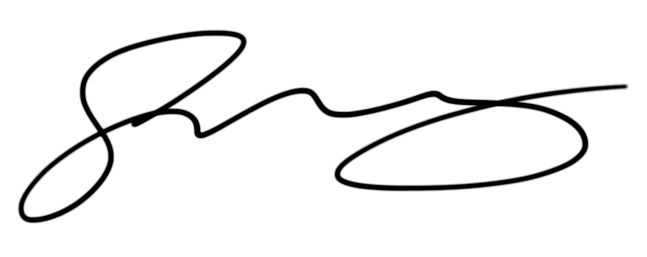
Greg Williams, Founder, Hollywood Authentic
There is a map of the world on the wall of Thuso Mbedu’s apartment in the San Fernando Valley, the sprawling satellite suburb that lies to the northwest of the Los Angeles mothership. Written in large, cursive script at the bottom of the poster is the phrase “She’s going places”. A handful of dots are scattered across the representation of the globe, indicating cities and countries that the actor has visited since she moved to the valley in 2020. But, she assures me, the picture is incomplete – she still has to add Utah (Sundance Film Festival), Zurich (movie promotional work), Dubai and Singapore (Christmas/New Year holidays), with – upcoming – Milan and Paris (fashion shows), Seoul, Tokyo and Shanghai (birthday celebrations). She will be 32 this year, although that is hard to believe, given she plays late-teens so convincingly.
Thuso is certainly going places, but what the wallchart can’t really illustrate is just how far she has come in a relatively short time. I am in her apartment to talk about that journey from Pietermaritzburg, a city about 45 minutes from Durban (“Although that depends on who’s driving,” she laughs) to Hollywood’s top table, thanks to a brace of remarkable performances in Amazon’s The Underground Railroad and subsequently, The Woman King, with Viola Davis. There’s a lot to talk about. But first, breakfast.
Here’s the thing, though. Thuso doesn’t really do breakfast. “I have cereal,” she offers. “I find it gives me energy to go and work out. Otherwise, I’ll just grab a banana. I usually have Raisin Bran Crunch, because I’ve got a weird digestive system, so I need to have the bran and the fibre or whatever.”
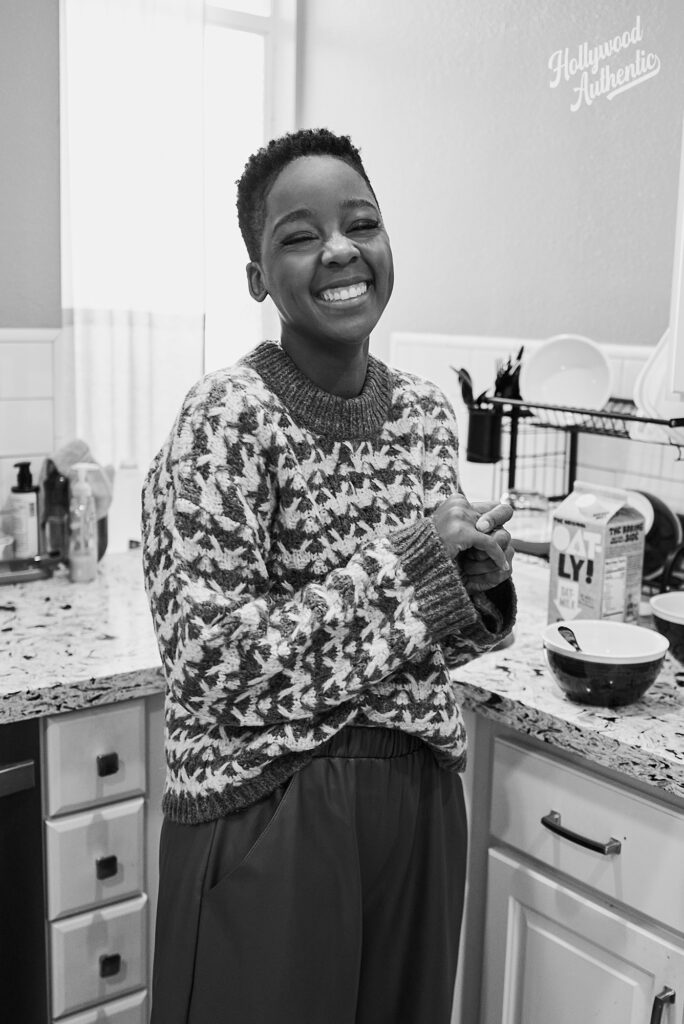
I don’t usually eat cereal. Or drink cow’s milk. But it is Thuso’s breakfast we are here for, not mine. Then: “And I’m lactose-intolerant. So, it’s oat milk with cereal. Is that OK?” It is. “Although I will sometimes order in an omelette. I love omelettes.”
As Thuso pours us oversize bowls (next to her slender frame anyway) of Raisin Bran, I speculate that the fact she has omelettes delivered suggests she is not much of a hob botherer. “I love food. But hate cooking. I tell people they can come and stay in the spare room, but don’t expect me to look after you. I love the kitchen in my apartment, but mainly because it has great light for selfies.”
So, I ask, if she doesn’t make much use of the oven or hob, what’s in the fridge? She laughs, half embarrassed. “Water. Lots of water.”
So, there is. Plus, half a red onion, which remains a mystery. The water is all Essentia brand. Is that significant? “Yes! Because when I first arrived in America, I thought all the water was disgusting. And then one day our costume department head for The Underground Railroad was, like, ‘Oh, would you like some Essentia?’ So, I had a sip. And it was, like, ‘Oh my gosh, this reminds me of home.’ It was the best-tasting water I ever had. All the South Africans know that when they come to America, they need to get Essentia water, because that’s the water that they’ll enjoy, just like home.” Home, as we shall see, is all-important in appreciating Thuso’s back story. Everything circles round to South Africa and family – or lack of it. In The Woman King, Thuso’s character, Nawi, the wannabe Agojie warrior, tells Viola Davis’s Nanisca that she, too, has suffered in life. This actor didn’t have to dig too deep for that.
“My sister and I lost our mother to a brain tumour when I was four years old. And we didn’t have much of a relationship with our father. He was never in our lives. And so, our grandmother raised us. She was super strict.” Thuso screws her thumbs into the tabletop to press the point home. “Super, super strict, because her second husband – our grandfather had passed away – her second husband was the first black bishop in South Africa. So, we grew up under that – ‘This is so-and-so’s household, you will not misbehave.’ It was scary.”
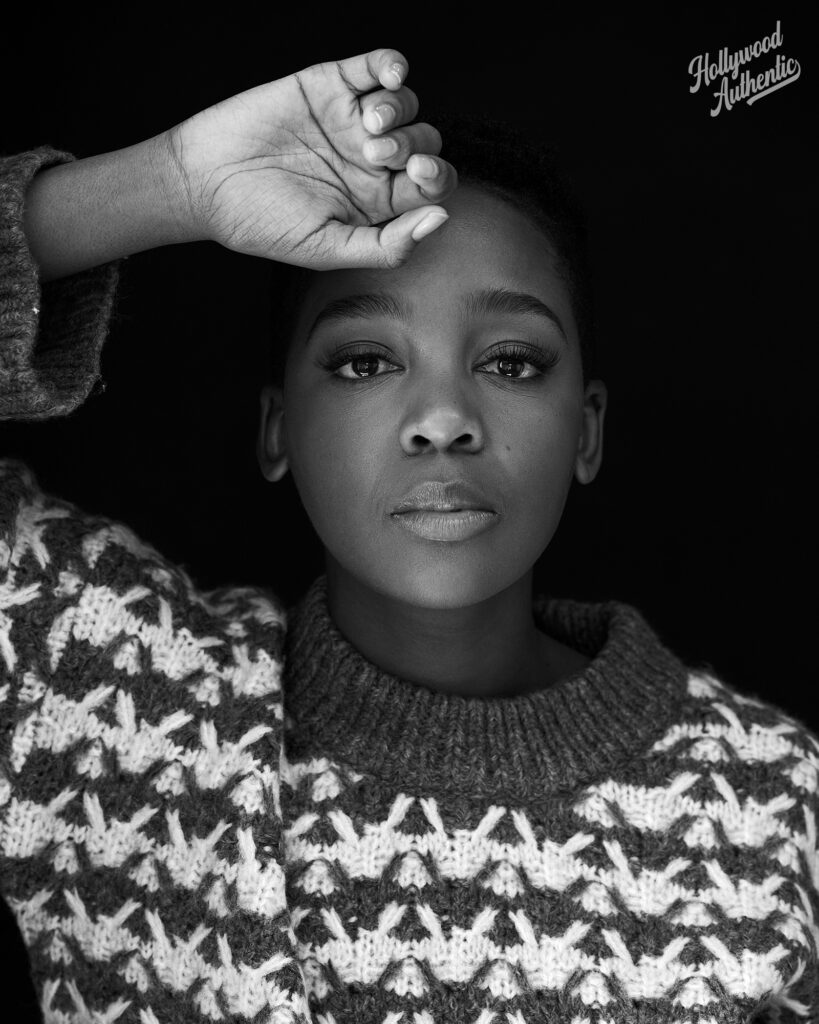
She had an older sister, though, for support. She laughs, but there is a rueful undertone to it. “I think growing up, between my sister and myself, I was the quieter of the two. I was the more observational one. I guess to some extent the more sensitive of the two as well. And the shy one. My sister was the more extroverted one. We were told that people liked her more. So, I had to accept that that meant people didn’t like me, which was a lonely existence.”
I ask how such a morally conventional and heavily religious family felt about her choice of an acting career. “My mother had wanted to be a geologist. That was her heart, that was her interest. But because the [apartheid] system didn’t allow it, she became a teacher who taught maths, sciences and geography. Under that system, you could become a teacher or a nurse. My grandmother was actually a high-school principal. But we were the first generation who had the option to be doctors or to be whatever it is that we wanted to be. And that was expected of me. And then I chose the arts, which made absolutely no sense to anyone at home.” Another burst of laughter, but this is one of genuine joy, because, of course, things have gone rather well for her.
“Yes, but having told her that I didn’t see myself in an office or a lab coat doing a nine to five, my grandmother didn’t talk to me for about a month, because she really believed that I wouldn’t be there for the family.”
Her eyes widen to emphasise the importance of her next statement. “But our grandmother did a very good job raising us, as hard as it was.” And, obviously, her grandmother is where her drive comes from. “Yes, yes. And my sister and I are super, super close now, especially since our grandmother passed away the year after I finished university and we realised we only have each other in this world.”
That flash of her eyes reminds me of how much she can convey non-verbally. In a review of director Barry Jenkins harrowing, hallucinatory but essential The Underground Railroad, The New York Times said, “Mbedu’s magnetic performance relies as much on gesture and expression as dialogue, her every sign, flinch and defence conveying the muscle memory of terror.” Where, I ask her, does that capacity for mute communication come from?
“I think it’s because of the way I grew up. I’m a person who spends a lot of her time in her head. I think it’s allowing whatever the character’s thought process is to actually happen in real time. Instead of imposing, ‘Oh, she should be feeling like this right now,’ let it happen. And then, as a human being, your face will adjust accordingly.”
That trust in her ability to reflect inner turmoil or joy has served her well. After success in her homeland, particularly from her International Emmy-winning portrayal of Winnie in the teen drama Is’thunzi, she was given the opportunity to display her craft on an international stage, and she grabbed it with both hands and all her heart. Her performances as Cora, the escaped slave in The Underground Railroad, and Nawi, the kick-ass fighter in The Woman King, demonstrated that extraordinary gift for externalising the internal without resorting to dialogue or exposition.
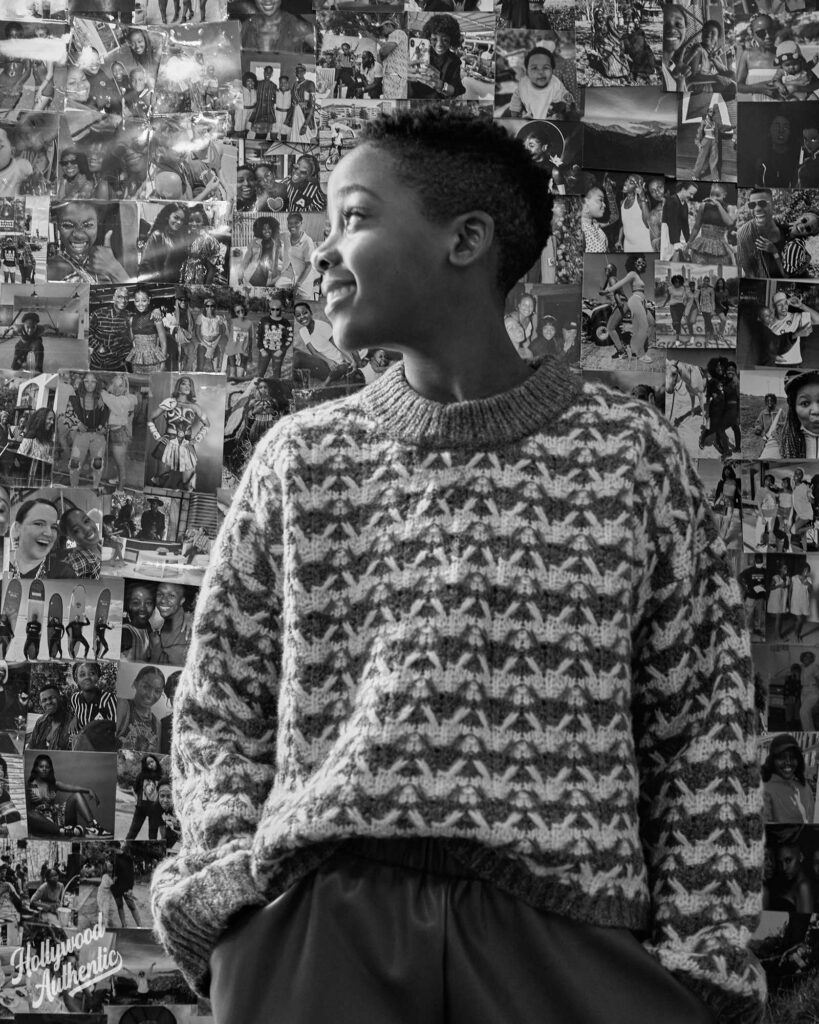
Thuso clearly had to train hard for the latter role and, as we move to her compact gym and she demonstrates the hi-tech treadmill (“My favourite”) and her boxing skills, she explains that she has kept up the demanding physical regime from The Woman King. “I work out with Gabriela Mclain, who was our trainer and nutritionist for the movie, between four and six times a week, depending on the schedule. Obviously, you have to stop when you do press for the movie, but I’m getting back into it now. And then we did different types of martial arts. So, at some point I went and got myself this bag so I could box. Now, I want to go back to Muay Thai as well, because I started that for the movie.”
Is the physical side just part of her discipline as an actor? “I spoke with Danny Hernandez, our stunt coordinator, who knows that I did fall in love with [the training]. He was just, like, ‘Keep going,’ so that I am ready for the next project, so that I don’t feel like I have to start from zero again when the next opportunity arrives.”
So, what is the next opportunity? Because it must be a very exciting time to be Thuso Mbedu. It’s hard to believe the phone ever stops ringing. “It is exciting,” she agrees. “I’m also in a space where, again, I’m getting opportunities that I wouldn’t have gotten in the past, having conversations with the different studios. Not only are they, like, ‘Oh, we’ve got these types of project that you could fit in,’ they’re also asking, ‘What would you like to develop?’ And that’s where my mind is. Hence, reading up on different things, putting ideas to paper.”
This reading up on different things includes researching the techniques of anime, manga and American comic books – she is keen to write an anime script, having been a huge fan of Dragon Ball Z while growing up in South Africa. (Show time coincided with afternoon prayers, so she and her sister would alter the living-room wall clock to make sure devotions would be over by the time that afternoon’s episode began.) She is also learning Korean for her birthday travels. “The heads-up was that they don’t speak as much English as you might expect in Seoul, so I thought I’d learn some of the language. And it is kicking my bum.”
Also on her slate is a new deal with Paramount+ to create shows with a message – albeit not as preachy as that sounds – which will be the direct descendant of MTV Shuga, a Pan-African series she acted in, which tackled tough themes, such as living with AIDS and gender identity. “The new deal is about creating stories that will educate people in Africa, sub-Saharan Africa and South Africa about climate, health and equality. And so, it can be a documentary, it can be a film, it can be a series. And they liked the ideas that we had given them, and so the next step is to develop it.”
It is interesting that, rather than looking for the next blockbuster, Thuso is keen on ploughing some of her good fortune back into her homeland and beyond. Where did this drive to serve come from? “I think at some point in high school, it was a case of knowing that my life could have turned out completely differently, had it not been for our grandmother. And so, I had the conviction that I should be that for someone else, even if it’s just one person. And so now I’m, like, OK, how do I use the gifts and the talents that I have to help someone else?”
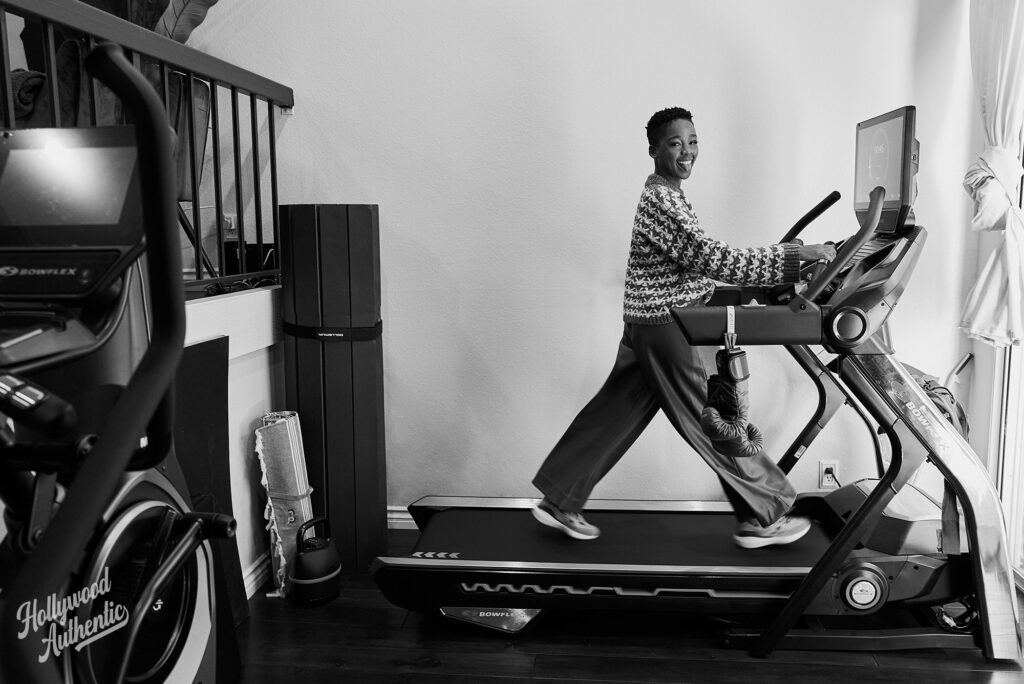
So, is this where the plan to help fund an orphanage comes from – an idea I have heard she has talked about? “It is. I really believe that I’m on planet Earth to help those who do not have, to help enrich their lives in different ways that could literally be just me being there with them, listening to what they have to say to me, aiding financially, physically. And, yeah, I think that is my ultimate purpose. But before we even get to the orphanage, I want to actively try and find bursaries and scholarships for kids that can’t afford to go to school and have people fund them. The orphanage is my ultimate, ultimate, ultimate, in terms of changing lives. And then volunteering as well, so that by the time we are able to make the orphanage, it’s not a completely foreign experience to me. In the past when I was in South Africa, I’d volunteer at different orphanages to just come hang out with the kids a little bit, which was also scary for me because growing up, being super shy as I am, I always thought kids don’t like me.”
Given she has such an obviously fun and generous personality – as well as a whole arsenal of infectious laughs to call upon – I suggest that this is hard to believe. She shrugs. “I was told they didn’t like me, so I thought it was true. As a result, going into spaces where I have to interact with kids, I’m, like, ‘Are they going to like me? Am I going to make them cry?’ or whatever. But it’s been beautiful. And, of course, I have my first niece, my favourite person. She’s a kid who really likes me, and I get so surprised every time. I’m just, like, ‘Wow, she still likes me. Oh my gosh.’ It makes me so happy.”
It turns out Thuso has a whole “Wall of Happiness” – which is exactly that, a collage of beaming Thuso Mbedus with various friends, co-workers and family (including sister and niece) and at shoots for the likes of The Hollywood Reporter. “It’s random moments in my life. I know what is happening on the day in each picture and what about it brought me joy. Yeah.”
After we say goodbye and I am sitting in an Uber taking me back to LA proper, I realise something about the past few hours, an impression that has been forming throughout the morning. Although I have been invited into Thuso’s home, the place is low on creature comforts and high on practicality. The house seems to be entirely organised for the purpose of completing Thuso’s life mission: books for current projects, books for future projects, press photos, a trophy cabinet full of awards for her performance in The Underground Railroad, bottles of water, a desk and a gym. It all has a function. This is mission control for someone who has a plan. Put simply, Thuso Mbedu wants to change the world.
The Underground Railroad is available now on Amazon Prime Video; The Woman King is in cinemas now
When I was a really young child watching Disney films, I enjoyed the escapism. It was about being somewhere other than in the room, a distraction; and after being immersed for two hours I’d pretend to stay in that world for a while longer. I liked impersonating the characters, the manipulation of the voice and making people laugh. But I didn’t think of it as acting. And I didn’t want to be an actor. I wanted to sing, which is what I did until I ended up at drama school, where I realised that acting was going to take over as I was learning so much about myself.
But the singing helped. And it’s still in there, helping me find musicality in scripts. When you read a script you try to find the rhythm you naturally have and marry it with the rhythm that someone has written for you. My years of music have helped me pick the roles I should be doing – when the words just bounce off the page. But a script will also connect with me on an instinctive level. I’ve read heart-wrenching scripts but not felt anything, and I know if I don’t feel anything at that point it will be too much of a jump to perform it. At other times, the writing might not be heart-wrenching at all, but I’ve cried my eyes out, so I know my soul is connected to it.
I’m also looking to see whether I can trust the director. Do I feel their process is going to match mine, or if not, will it stretch me as an actor? You can almost sense that elasticity in a script – you can feel the challenge and the trepidation. Sometimes I say to myself, you can’t do it, but those are the ones I like to run towards. The ones that will change me as a human being. Because I don’t want to separate my work from my personal life. Work is helping me to grow as a woman, and to impart education and knowledge through these narratives. So I just know if it’s right. A lot of the women in my family have a knowing, and that has been passed down.
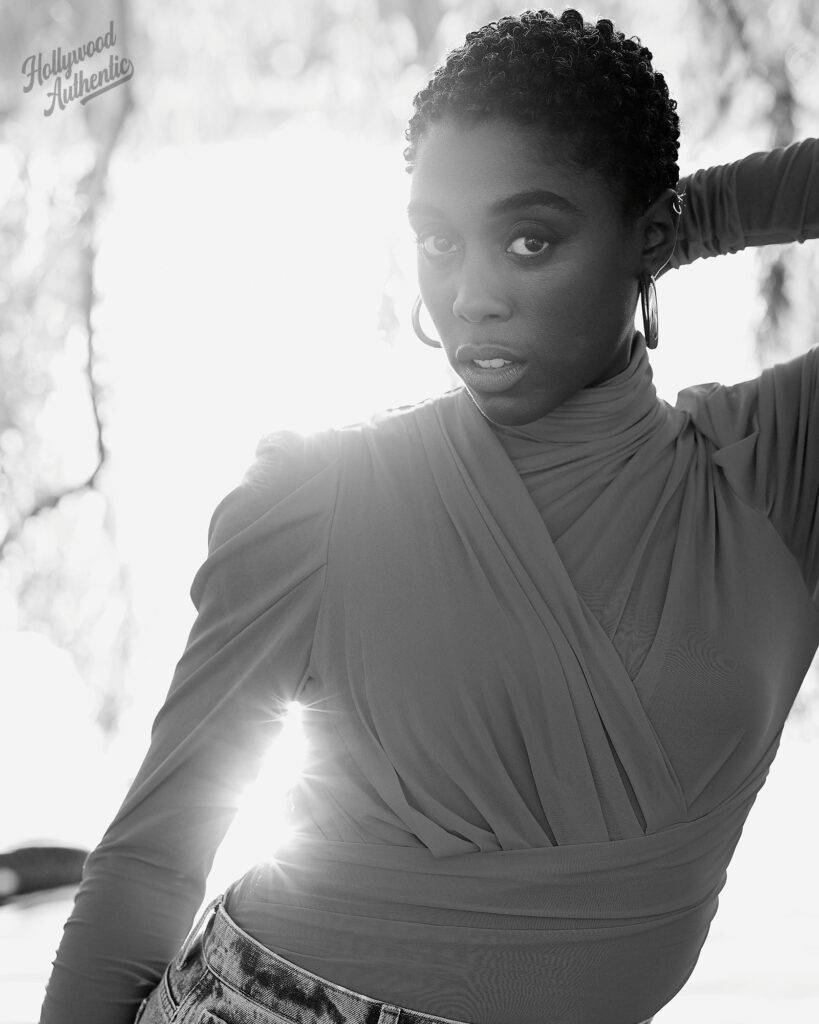
One thing I like is for my roles to have a degree of physicality. It’s a way into a character. In my first film, Fast Girls, I played an elite sprinter. I immersed myself in the preparation, and it was then that I also realised that in getting ready for a role I like to disappear as much as I can, as early as I can. Some people might not hear from me for a while, but in order to get to that place where you are fully committed you need to go away. It was all gym, track, diet.
I’d played sports at school and ran, did the high jump and long jump, so I felt I could do it. And when I look at that performance now, I feel I was just being myself. But I can see now that there is a little bit of you in the characters you play, and I’ve learned to use it. To use my background, and the things that make me happy or unhappy, or fearful. Use them as a springboard. Like when I played a single mother in a Marvel film [the pilot Maria Rambeau] and I drew on my own experience growing up with a single mother in Shepherd’s Bush.
My new film is also physical, but on a different level. The Woman King is based on a group of female warriors in Benin in the 18th century and when I read the script I could see the fighting, jumping and how vigorous it would be. The director Gina Prince-Bythewood was adamant that we had to be able to do the stunts ourselves. It’s nice when someone sees your capabilities before you do. And I didn’t see it. I was expecting stunt doubles! But as soon as a woman director sees your physique, your power, your inner strength, it’s a real compliment. I didn’t take that lightly. And I was able to use the training as a gateway into my character: the gravel in her voice, the pain she feels. I know her; she is my mate.
The Woman King was unusual as I was working with a Black female director. Usually I am not. And when I say there’s always a little bit of me in my characters, that goes for the responsibility I feel to ensure the Black experience, and the Black female experience, in particular, is portrayed authentically on screen. That often involves negotiation. When there are people who don’t look like me telling my story it can be weird, as I find myself teaching a whole life history. But if I were to step back and allow creatives to tell my story inaccurately, that would be irresponsible.
Of course, as a young actor it is hard to have agency on a film set and put your hand up and say, I disagree, or I have a better idea. But now, after a few years of doing it, I am confident enough.
That’s not to say my confidence isn’t challenged on occasion. Like when I had to play opposite Daniel Craig in No Time to Die, where I was not only representing a new 007 [her character, Nomi, has taken his code name], but a young, Black, female 007 at that. Daniel was great though, and calmed me completely by saying: ‘This is like an indie [film] with loads of money.’ He meant that we should regard it as just another day at the office, and I realised that though this was Daniel Craig and there were 24 Bond movies that came before and that this really is a cinematic institution, here I was, just showing up for work and creating art. And if I failed to have that attitude I’d be doing myself and the franchise a disservice. So, you come in, you have conversations with the creative team, you collaborate as much as possible, and it will be OK.
What also really comforted me was that we were starting the first two weeks of the shoot in Jamaica. I’m Jamaican, so there could be no more comfortable start to a job than being in Jamaica. Unless it was in Shepherd’s Bush.
The Woman King is out now